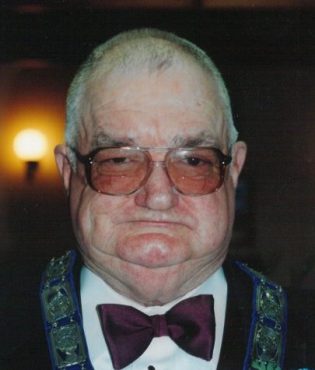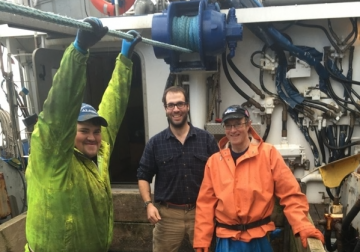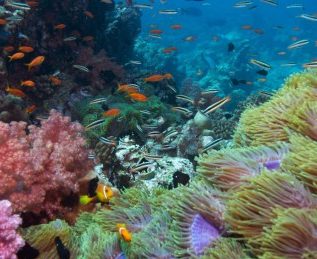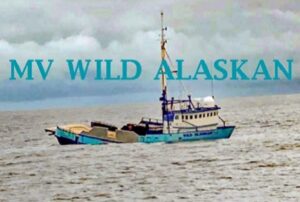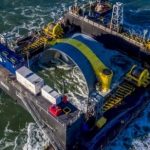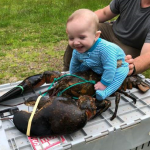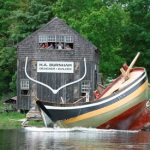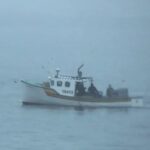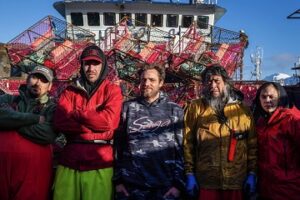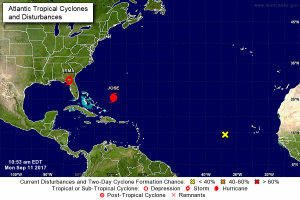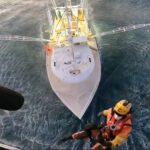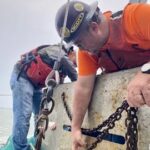Monthly Archives: June 2016
The spinoff: ‘Deadliest Catch’ – Dungeon Cove ’the crab fishermen of Newport, Oregon
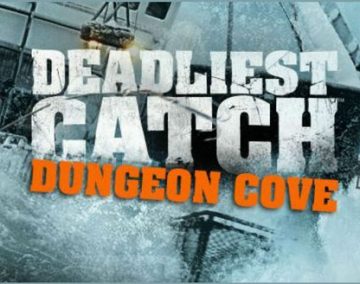 Deadliest Catch has taken us to the Bering Sea for 12 seasons and counting. But the spinoff, premiering Sept. 13, will take us to a location even more treacherous. Deadliest Catch: Dungeon’s Cove follows Dungeness crab fishermen who call Newport, Oregon — and its dangerous sandbars and currents — home. Their fishing grounds are part of the “Graveyard of the Pacific,“ which stretches from Oregon to British Columbia and is considered the deadliest commercial fishery in the world with thousands of vessels and lives lost. Watch the trailer here 13:01
Deadliest Catch has taken us to the Bering Sea for 12 seasons and counting. But the spinoff, premiering Sept. 13, will take us to a location even more treacherous. Deadliest Catch: Dungeon’s Cove follows Dungeness crab fishermen who call Newport, Oregon — and its dangerous sandbars and currents — home. Their fishing grounds are part of the “Graveyard of the Pacific,“ which stretches from Oregon to British Columbia and is considered the deadliest commercial fishery in the world with thousands of vessels and lives lost. Watch the trailer here 13:01
North Carolina Fisheries Association Weekly Update for June 27, 2016
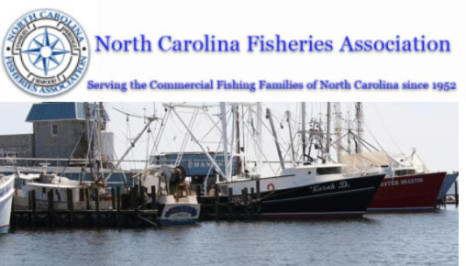 Click here to read the Weekly Update, to read all the updates, Click here 12:19
Click here to read the Weekly Update, to read all the updates, Click here 12:19
Wide Bay net ban candidate Lucy Stanton says Fishermen using ‘machine guns’ to intimidate
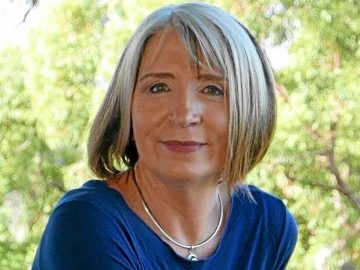 PROFESSIONAL fishermen have been accused of using machine guns to intimidate residents and visitors in the area between the Noosa River and Teewah, Wide Bay Labor candidate Lucy Stanton has claimed. Ms Stanton also accused some professional netters of defying food safety and camping regulations and deliberately scaring away witnesses. She has advocated extending Fraser Island’s World Heritage area to the mainland, including a ban on inshore net fishing. “The people living on Noosa North Shore and those tourists visiting are being forced to put up with shocking behavior on the part of commercial netters,” she said. “Residents have reported automatic gunfire at night during this latest episode of worrying behavior on the part of these people. “They lack respect for people and have even less regard for the environment. Read the rest here 09:59
PROFESSIONAL fishermen have been accused of using machine guns to intimidate residents and visitors in the area between the Noosa River and Teewah, Wide Bay Labor candidate Lucy Stanton has claimed. Ms Stanton also accused some professional netters of defying food safety and camping regulations and deliberately scaring away witnesses. She has advocated extending Fraser Island’s World Heritage area to the mainland, including a ban on inshore net fishing. “The people living on Noosa North Shore and those tourists visiting are being forced to put up with shocking behavior on the part of commercial netters,” she said. “Residents have reported automatic gunfire at night during this latest episode of worrying behavior on the part of these people. “They lack respect for people and have even less regard for the environment. Read the rest here 09:59
Sen. Marco Rubio calls for Commerce IG to review controversial red snapper regulations
 The National Oceanic and Atmospheric Administration, which sets the rules, announced last month that the 2015 ban would be extended into 2016. In his letter, Rubio argues that the years-long plan isn’t working and that public distrust is at “an all-time high.” A study of red snapper populations released in April found that the species still hasn’t recovered from over fishing and is still being overfished despite the strict regulations. While anglers must release red snapper, biologists estimate that roughly 40 percent of fish caught and released will later die due to the trauma of being reeled in from the ocean’s deep depths. But many fishermen dispute the study’s findings and have long criticized the regulations. Skeptics say they’re catching plenty of red snapper, which suggests the species is healthy enough to support harvesting. Read the rest here 08:23
The National Oceanic and Atmospheric Administration, which sets the rules, announced last month that the 2015 ban would be extended into 2016. In his letter, Rubio argues that the years-long plan isn’t working and that public distrust is at “an all-time high.” A study of red snapper populations released in April found that the species still hasn’t recovered from over fishing and is still being overfished despite the strict regulations. While anglers must release red snapper, biologists estimate that roughly 40 percent of fish caught and released will later die due to the trauma of being reeled in from the ocean’s deep depths. But many fishermen dispute the study’s findings and have long criticized the regulations. Skeptics say they’re catching plenty of red snapper, which suggests the species is healthy enough to support harvesting. Read the rest here 08:23
Listed fishing boats that are registered for commercial fishing in Massachusetts
 This table lists fishing boats that are registered for commercial fishing in Massachusetts, along with the vessels’ owners. The data can be sorted by the boat’s name, the boat owner’s name (first name first), the boat owner’s home community, the boat’s home port and principal port. Boats, large and small, can also be sorted numerically by their length in feet. Note: Only boats that list a home port in Massachusetts are included in this table. Some boats may be owned in one state and ported in another. This listing includes boats used for myriad types of commercial fishing, including ground fishing, lobsters, shellfish, etc. 25 per page, 44 pages with 1048 listed Source – NOAA Fisheries 2016 vessel permit data, Greater Atlantic Region Read the list here 20:07
This table lists fishing boats that are registered for commercial fishing in Massachusetts, along with the vessels’ owners. The data can be sorted by the boat’s name, the boat owner’s name (first name first), the boat owner’s home community, the boat’s home port and principal port. Boats, large and small, can also be sorted numerically by their length in feet. Note: Only boats that list a home port in Massachusetts are included in this table. Some boats may be owned in one state and ported in another. This listing includes boats used for myriad types of commercial fishing, including ground fishing, lobsters, shellfish, etc. 25 per page, 44 pages with 1048 listed Source – NOAA Fisheries 2016 vessel permit data, Greater Atlantic Region Read the list here 20:07
U.S. Commerce Department announces 2016 regional fishery council appointments
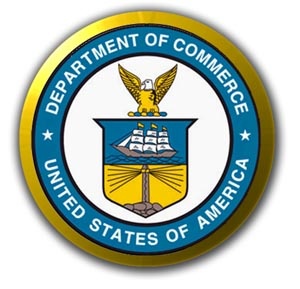 The U.S. Commerce Department today announced the appointment of 19 new and returning members to the eight regional fishery management councils that partner with NOAA Fisheries to manage ocean fish stocks. One at-large seat on the Mid-Atlantic Council will be announced by the Secretary at a later date. The new and reappointed council members begin their three-year terms on August 11. Each year, the Secretary of Commerce appoints approximately one-third of the total 72 appointed members to the eight regional councils. The Secretary selects members from nominations submitted by the governors of fishing states, territories and tribal governments. Council members are appointed to both obligatory (state-specific) and at-large (regional) seats. Council members serve a three-year term and can get reappointed to serve three consecutive terms. Asterisks preceding a member’s name indicate a reappointment. Read it here 17:24
The U.S. Commerce Department today announced the appointment of 19 new and returning members to the eight regional fishery management councils that partner with NOAA Fisheries to manage ocean fish stocks. One at-large seat on the Mid-Atlantic Council will be announced by the Secretary at a later date. The new and reappointed council members begin their three-year terms on August 11. Each year, the Secretary of Commerce appoints approximately one-third of the total 72 appointed members to the eight regional councils. The Secretary selects members from nominations submitted by the governors of fishing states, territories and tribal governments. Council members are appointed to both obligatory (state-specific) and at-large (regional) seats. Council members serve a three-year term and can get reappointed to serve three consecutive terms. Asterisks preceding a member’s name indicate a reappointment. Read it here 17:24
Black gill disease shows up early in Georgia shrimp
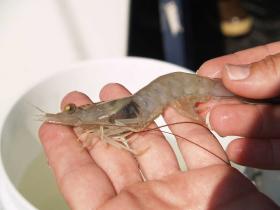 “We’re seeing 40 percent of our white shrimp infected,” said Pat Geer, chief of fisheries at the Georgia Department of Natural Resources. “We have never seen that before. Ever. So why, why are we seeing it that much earlier?” Geer put that question to a gathering of researchers, shrimpers and fisheries managers from Georgia and South Carolina on Wednesday at the University of Georgia Aquarium at Skidaway. Though unattractive, black gill shrimp are safe to eat. The discoloration is a result of a parasite that infects the gills. When it does, that tissue reacts by producing melanin, resulting in the tell-tale blackening. Researchers have determined the culprit is a ciliate, a single-celled organism with hair-like structures that propel it, but they haven’t been able to nail down which species it is. Read the story here 15:12
“We’re seeing 40 percent of our white shrimp infected,” said Pat Geer, chief of fisheries at the Georgia Department of Natural Resources. “We have never seen that before. Ever. So why, why are we seeing it that much earlier?” Geer put that question to a gathering of researchers, shrimpers and fisheries managers from Georgia and South Carolina on Wednesday at the University of Georgia Aquarium at Skidaway. Though unattractive, black gill shrimp are safe to eat. The discoloration is a result of a parasite that infects the gills. When it does, that tissue reacts by producing melanin, resulting in the tell-tale blackening. Researchers have determined the culprit is a ciliate, a single-celled organism with hair-like structures that propel it, but they haven’t been able to nail down which species it is. Read the story here 15:12
Two Maryland fishermen banned from fishing for striped bass forever
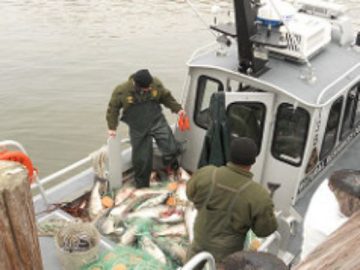 The Maryland Department of Natural Resources said that Michael D. Hayden Jr. and William J. Lednum, both of Tilghman Island, have received lifetime revocations of their striped bass privileges and have been suspended from all commercial fishing activity for the next year, followed by a four-year probationary period in all other fisheries. Their striped bass allocations are being returned to the commercial fishery allotment. In simpler terms, the two men were convicted of poaching and selling nearly $500,000 of striped bass over four years and have received lifetime bans from taking part in that fishery. Hayden and Lednum remain responsible for $498,000 in court-ordered restitution to the state of Maryland. Read the rest here 13:23:08
The Maryland Department of Natural Resources said that Michael D. Hayden Jr. and William J. Lednum, both of Tilghman Island, have received lifetime revocations of their striped bass privileges and have been suspended from all commercial fishing activity for the next year, followed by a four-year probationary period in all other fisheries. Their striped bass allocations are being returned to the commercial fishery allotment. In simpler terms, the two men were convicted of poaching and selling nearly $500,000 of striped bass over four years and have received lifetime bans from taking part in that fishery. Hayden and Lednum remain responsible for $498,000 in court-ordered restitution to the state of Maryland. Read the rest here 13:23:08
Oceana researchers say getting federal data on fish stocks is a challenge
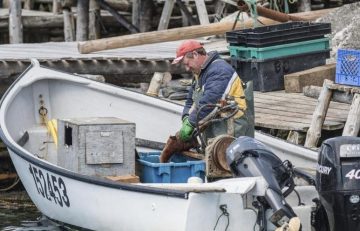 A team of researchers that spent months digging up data, hounding scientists and chasing leads to assess the state of Canadian fish stocks say old, incomplete or inaccessible federal research means the health of nearly half of the country’s commercial fish stocks remains a mystery. Oceana Canada, a non-profit advocacy group whose work focuses on ocean health, released a report last week that it claims is “the most comprehensive public study ever conducted” on the state of Canada’s fish stocks. But the report’s authors say they faced barriers accessing federal data that could allow them to properly determine whether commercial fish stocks are healthy. (which didn’t stop them from saying the fishery’s are in severe decline) Read the rest here 12:35
A team of researchers that spent months digging up data, hounding scientists and chasing leads to assess the state of Canadian fish stocks say old, incomplete or inaccessible federal research means the health of nearly half of the country’s commercial fish stocks remains a mystery. Oceana Canada, a non-profit advocacy group whose work focuses on ocean health, released a report last week that it claims is “the most comprehensive public study ever conducted” on the state of Canada’s fish stocks. But the report’s authors say they faced barriers accessing federal data that could allow them to properly determine whether commercial fish stocks are healthy. (which didn’t stop them from saying the fishery’s are in severe decline) Read the rest here 12:35
NMFS Shoots Down Defenders of Wildlife petition to list Smooth Hammerhead Shark under Endangered Species Act
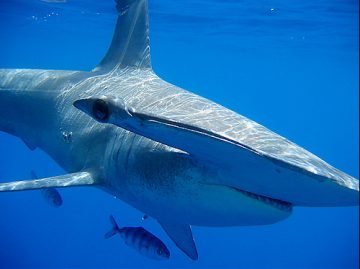 We, NMFS, announce a 12-month finding on a petition to list the smooth hammerhead shark (Sphyrna zygaena) as threatened or endangered under the Endangered Species Act (ESA). We have completed a comprehensive status review of the smooth hammerhead shark in response to this petition. Based on the best scientific and commercial information available, including the status review report (Miller 2016), we have determined that the species does not warrant listing at this time. We conclude that the smooth hammerhead shark is not currently in danger of extinction throughout all or a significant portion of its range and is not likely to become so within the foreseeable future. Read the rest here 11:28
We, NMFS, announce a 12-month finding on a petition to list the smooth hammerhead shark (Sphyrna zygaena) as threatened or endangered under the Endangered Species Act (ESA). We have completed a comprehensive status review of the smooth hammerhead shark in response to this petition. Based on the best scientific and commercial information available, including the status review report (Miller 2016), we have determined that the species does not warrant listing at this time. We conclude that the smooth hammerhead shark is not currently in danger of extinction throughout all or a significant portion of its range and is not likely to become so within the foreseeable future. Read the rest here 11:28
BP spill cost fishing industry at least $94.7 million to $1.6 billion from May through December 2010
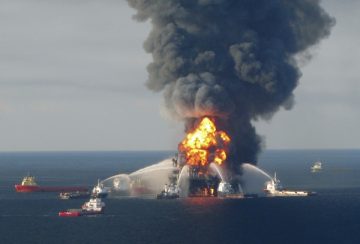 The BP oil spill may have cost the Gulf of Mexico’s commercial fishing industry between $94.7 million and $1.6 billion and between 740 and 9,315 jobs from May to December 2010, according a study released Wednesday (June 22) by the Bureau of Ocean Energy Management. The study, conducted by The Vertex Companies of Boston, Mass., measured the impact of the spill during the same period of time that is being used to calculate claims being paid to fishermen under a 2012 court-approved settlement agreement between private parties and BP. The three-year study cost $355,888. Louisiana’s commercial fishing industry bore the brunt of the costs of the spill, compared to the four other Gulf states, the report found, with the highest costs affecting the catch of shrimp, oysters, crabs and menhaden. Read the rest here 10:34
The BP oil spill may have cost the Gulf of Mexico’s commercial fishing industry between $94.7 million and $1.6 billion and between 740 and 9,315 jobs from May to December 2010, according a study released Wednesday (June 22) by the Bureau of Ocean Energy Management. The study, conducted by The Vertex Companies of Boston, Mass., measured the impact of the spill during the same period of time that is being used to calculate claims being paid to fishermen under a 2012 court-approved settlement agreement between private parties and BP. The three-year study cost $355,888. Louisiana’s commercial fishing industry bore the brunt of the costs of the spill, compared to the four other Gulf states, the report found, with the highest costs affecting the catch of shrimp, oysters, crabs and menhaden. Read the rest here 10:34
Cameron Henderson, Tin Can Bay Chamber of Commerce is a reasonable man
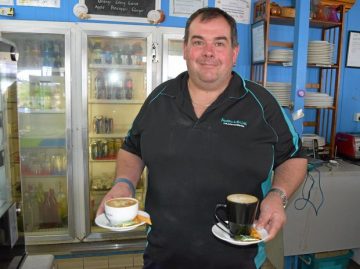 With the most important federal election in many years due in just a week, I thought that it may be beneficial to share some information learnt recently. Whilst a chamber of commerce remains “apolitical”, it sometimes becomes hard to remain impartial. I have had several discussions with the ALP candidate for the Wide Bay, Lucy Stanton. Her plans for this region are to shut down commercial net fishing and have the area World Heritage listed. Ms Stanton argues that fish stocks have declined due to commercial fishing alone; I have been informed that there are many factors as to why fish stocks fluctuate over the years. Commercial fishing is not the sole reason. The commercial fishing industry is heavily regulated and licence holders are held accountable. Evidence recently circulated claiming otherwise is outdated and inconclusive in my mind. Graphs and charts can be manipulated to suit an agenda. Read this letter here 20:41
With the most important federal election in many years due in just a week, I thought that it may be beneficial to share some information learnt recently. Whilst a chamber of commerce remains “apolitical”, it sometimes becomes hard to remain impartial. I have had several discussions with the ALP candidate for the Wide Bay, Lucy Stanton. Her plans for this region are to shut down commercial net fishing and have the area World Heritage listed. Ms Stanton argues that fish stocks have declined due to commercial fishing alone; I have been informed that there are many factors as to why fish stocks fluctuate over the years. Commercial fishing is not the sole reason. The commercial fishing industry is heavily regulated and licence holders are held accountable. Evidence recently circulated claiming otherwise is outdated and inconclusive in my mind. Graphs and charts can be manipulated to suit an agenda. Read this letter here 20:41
Wisconsin DNR ponders commercial whitefish regulation changes, Sport fishers concerned
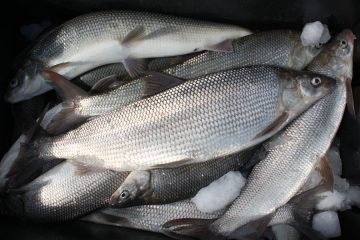 A leading Wisconsin sportfishing advocate is urging anglers to provide input as the Department of Natural Resources considers changes to rules in Green Bay and Lake Michigan. Based on shifts in whitefish abundance, the DNR is mulling changes to its commercial fishing framework for the species. Although the agency has yet to release a proposed rules change, commercial interests have been seeking higher whitefish quotas in southern Green Bay or the ability to use unfilled quotas from other zones in the lower bay. And some commercial fishers would like to be able to sell walleye taken as “bycatch.” Walleye currently are protected from commercial fishing in Wisconsin. Read the rest here 16:39
A leading Wisconsin sportfishing advocate is urging anglers to provide input as the Department of Natural Resources considers changes to rules in Green Bay and Lake Michigan. Based on shifts in whitefish abundance, the DNR is mulling changes to its commercial fishing framework for the species. Although the agency has yet to release a proposed rules change, commercial interests have been seeking higher whitefish quotas in southern Green Bay or the ability to use unfilled quotas from other zones in the lower bay. And some commercial fishers would like to be able to sell walleye taken as “bycatch.” Walleye currently are protected from commercial fishing in Wisconsin. Read the rest here 16:39
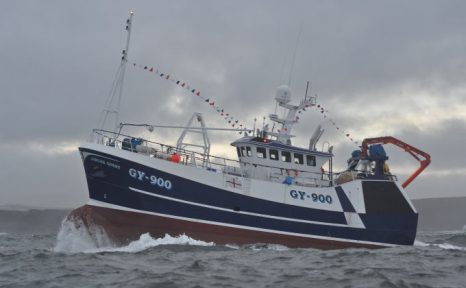
Brexit – Entering uncharted territory,turbulent waters, with challenges and perhaps also opportunities.
Two things can be said with certainty: 1. At this stage there are more questions than answers 2. In this new world, fishermen will need a strong, cohesive, national organisation to defend their interests during the upcoming transition It is not difficult to understand the strong anti-EU sentiments within the UK fishing industry. The European Commission has too often behaved with arrogance, and the EU Parliament with ignorance, to escape their share of the blame. To understand this, you need to go no further that the Commission’s proposed EU ban on small-scale drift nets – to solve an enforcement problem in Italy but which if adopted would have extinguished many sustainable, viable small-scale fisheries in the UK. This is but one example which just illustrates the roots of the frustration that has built over many years. Read the rest here 14:41
Fading fishermen: A historic industry faces a warming world
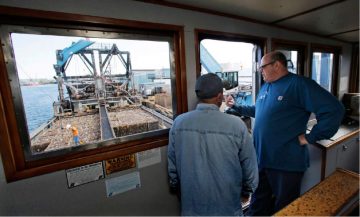 The cod isn’t just a fish to David Goethel. It’s his identity, his ticket to middle-class life, his link to a historic industry. Robert Bradfield was one of the East Coast’s most endangered species, a Rhode Island lobsterman, until he pulled his traps out of the water for the last time about a decade ago. Michael Mohr harvested surf clams for almost 30 of his 55 years, and his desire to stay in the business takes him far from his family. For the fishermen of the northeastern U.S., whether to stick with fishing, adapt to the changing ocean or leave the business is a constant worry. Read the story here 13:56
The cod isn’t just a fish to David Goethel. It’s his identity, his ticket to middle-class life, his link to a historic industry. Robert Bradfield was one of the East Coast’s most endangered species, a Rhode Island lobsterman, until he pulled his traps out of the water for the last time about a decade ago. Michael Mohr harvested surf clams for almost 30 of his 55 years, and his desire to stay in the business takes him far from his family. For the fishermen of the northeastern U.S., whether to stick with fishing, adapt to the changing ocean or leave the business is a constant worry. Read the story here 13:56
Coast Guard medevacs injured fisherman near Kodiak, Alaska
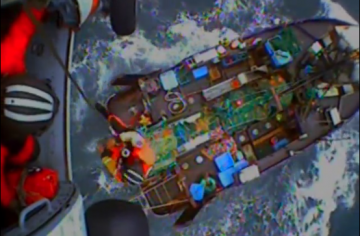 The Coast Guard medevaced a 26-year-old fisherman from the 79-foot fishing vessel Pacific Star approximately 74 miles southeast of the city of Kodiak, Alaska, Saturday. A Coast Guard Air Station Kodiak MH-60 Jayhawk helicopter crew hoisted the injured fisherman and transported him to awaiting emergency medical services personnel at the Kodiak Airport. Coast Guard Sector Anchorage watchstanders received the call for assistance at approximately 11:03 a.m. from the operator of the Pacific Star that a deckhand had been struck in the head by deck rigging and needed medical attention. Watchstanders consulted the duty flight surgeon who recommended the medevac. The Jayhawk helicopter crew was dispatched to the scene. Click here to watch the video 12:03
The Coast Guard medevaced a 26-year-old fisherman from the 79-foot fishing vessel Pacific Star approximately 74 miles southeast of the city of Kodiak, Alaska, Saturday. A Coast Guard Air Station Kodiak MH-60 Jayhawk helicopter crew hoisted the injured fisherman and transported him to awaiting emergency medical services personnel at the Kodiak Airport. Coast Guard Sector Anchorage watchstanders received the call for assistance at approximately 11:03 a.m. from the operator of the Pacific Star that a deckhand had been struck in the head by deck rigging and needed medical attention. Watchstanders consulted the duty flight surgeon who recommended the medevac. The Jayhawk helicopter crew was dispatched to the scene. Click here to watch the video 12:03
Emmonak comes to life with summer fish plant jobs and commercial dipnetting
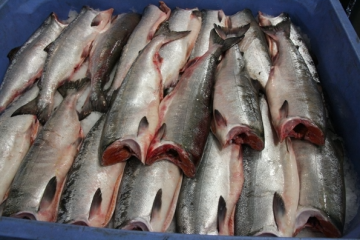 At the Yukon River’s fish central, the warning on the door to the buzzing office of the big boss, whom everyone calls “Jack,” says “Danger. Earache Area.”It’s the nerve center for Kwikpak Fisheries — a small dockside processor with an outsized role in a region where jobs are scarce, the salmon are ultra-rich, and a unique commercial dipnet fishery provides early season jobs and money. Kwikpak operations manager Jack Schultheis is buying summer chums from, as he put it, the only commercial dipnet operation “in the world.” It’s a novel setup intended to help rebuild crashed king salmon runs, but still allow fishing. During scheduled dipnet openings, residents with commercial permits from Emmonak and nearby Southwestern Alaska villages head out in open skiffs. Read the story here 10:25
At the Yukon River’s fish central, the warning on the door to the buzzing office of the big boss, whom everyone calls “Jack,” says “Danger. Earache Area.”It’s the nerve center for Kwikpak Fisheries — a small dockside processor with an outsized role in a region where jobs are scarce, the salmon are ultra-rich, and a unique commercial dipnet fishery provides early season jobs and money. Kwikpak operations manager Jack Schultheis is buying summer chums from, as he put it, the only commercial dipnet operation “in the world.” It’s a novel setup intended to help rebuild crashed king salmon runs, but still allow fishing. During scheduled dipnet openings, residents with commercial permits from Emmonak and nearby Southwestern Alaska villages head out in open skiffs. Read the story here 10:25
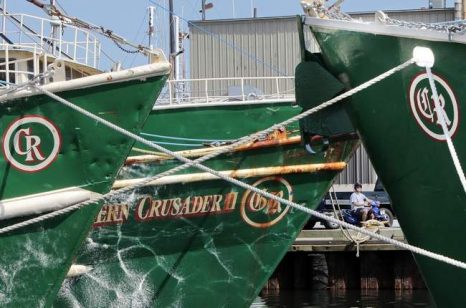
Carlos “The Codfather” Rafael’s trial could have huge stakes
Indicted fishing magnate Carlos Rafael controls nearly one-fifth of the harbor’s commercial fleet and had permits worth about $80 million last year, according to public records and local interviews. The size and scope of Rafael’s fishing business indicate a significant chunk of New Bedford’s waterfront economy could be at stake should Rafael stand trial in January 2017. He faces federal charges tied to an alleged, multi-year scheme involving illegally caught fish, bags of cash from a wholesale buyer in New York City and a smuggling operation to Portugal, via Logan International Airport in Boston. An initial survey of Rafael’s fishing permits, vessels and the corporations behind them, along with local data and interviews, provides a glimpse into an operation that has become a flashpoint for broader debates about industry regulation and oversight. Read the article here 09:08
Coast Guard rescues 2 fishermen from disabled vessel near Cordova, Alaska
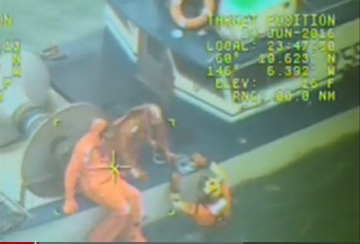 A Coast Guard MH-60 Jayhawk helicopter crew from Forward Operating Location Cordova rescued two fishermen approximately 17 miles southwest of Cordova, Alaska, after their fishing vessel became disabled and adrift Friday. The Jayhawk crew hoisted the fishermen from the fishing vessel Sunrise and transported them to Cordova. Coast Guard Sector Anchorage watchstanders received a request for assistance from the fishermen after their 26-foot fishing vessel became disabled and adrift near Strawberry Channel. Watchstanders issued an urgent marine information broadcast and diverted the rescue helicopter crew who were airborne and in the area on a training mission. Marine Safety Unit Valdez has issued a notice to mariners of the disabled vessel and continues to monitor the situation as the owner makes arrangements for retrieval. Click to watch the video 19:56
A Coast Guard MH-60 Jayhawk helicopter crew from Forward Operating Location Cordova rescued two fishermen approximately 17 miles southwest of Cordova, Alaska, after their fishing vessel became disabled and adrift Friday. The Jayhawk crew hoisted the fishermen from the fishing vessel Sunrise and transported them to Cordova. Coast Guard Sector Anchorage watchstanders received a request for assistance from the fishermen after their 26-foot fishing vessel became disabled and adrift near Strawberry Channel. Watchstanders issued an urgent marine information broadcast and diverted the rescue helicopter crew who were airborne and in the area on a training mission. Marine Safety Unit Valdez has issued a notice to mariners of the disabled vessel and continues to monitor the situation as the owner makes arrangements for retrieval. Click to watch the video 19:56
What are the clams economic impact on Greenwich?
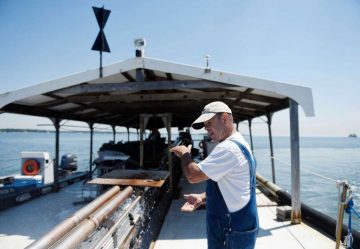 In his denim overalls and Simms fly fishing cap, Ed Stilwagen is where he can be found most days, checking in on his clamming boats and checking out the state of the water in Long Island Sound. “I always say the way to find clams is you go out there and you tell a clam joke. Then you hear ’em laughing, you go in and you get ’em,” Stilwagen said. Stilwagen is like a lot of people in Greenwich. He has two boats, a shiny black Cadillac and a lot of property. His boats, though, are for work and his property is mostly under water. The 4,000 acres he leases stretch about a mile into Long Island Sound. He is the largest clam harvester in Greenwich waters. “Since we been started here (in 2000), I calculate well over 300 million clams we’ve produced,” he said. Stilwagen’s crews are out on his pontoon-like clam boats sometimes seven days a week,,, Video, read the rest here and 31 photo’s. 17:57
In his denim overalls and Simms fly fishing cap, Ed Stilwagen is where he can be found most days, checking in on his clamming boats and checking out the state of the water in Long Island Sound. “I always say the way to find clams is you go out there and you tell a clam joke. Then you hear ’em laughing, you go in and you get ’em,” Stilwagen said. Stilwagen is like a lot of people in Greenwich. He has two boats, a shiny black Cadillac and a lot of property. His boats, though, are for work and his property is mostly under water. The 4,000 acres he leases stretch about a mile into Long Island Sound. He is the largest clam harvester in Greenwich waters. “Since we been started here (in 2000), I calculate well over 300 million clams we’ve produced,” he said. Stilwagen’s crews are out on his pontoon-like clam boats sometimes seven days a week,,, Video, read the rest here and 31 photo’s. 17:57
Yurok Tribe Files Intent to Sue National Marine Fisheries Service and the Bureau of Reclamation
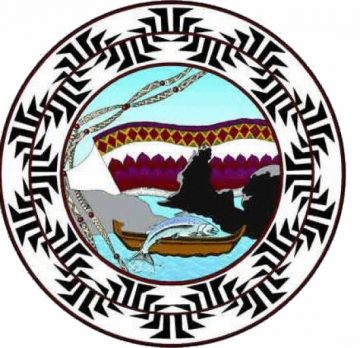 In response to massive fish disease outbreaks in back-to-back years on the Klamath River, the Yurok Tribe submitted a 60-day notice of intent to sue the National Marine Fisheries Service and the Bureau of Reclamation. “We cannot stand by and do nothing while our salmon hover over the brink of extinction,” said Thomas P. O’Rourke Sr., Chairman of the Yurok Tribe. “We will not continue to watch water managers jeopardize the fate of our fish and our river.” 91 percent of the juvenile, Klamath salmon were infected with a deadly parasite in 2015, as were a nearly identical number of fish in 2014. Given the nearly 100 percent mortality rate associated with the disease, approximately 90 percent of the Chinook salmon and likely an equal quantity of coho died in the main-stem Klamath River during those years, according to the notice. This year’s predicted adult salmon run is one of the lowest on record, which forced the Yurok Tribe to make a difficult decision to completely forgo all commercial fishing in 2016. Read the rest here 15:22
In response to massive fish disease outbreaks in back-to-back years on the Klamath River, the Yurok Tribe submitted a 60-day notice of intent to sue the National Marine Fisheries Service and the Bureau of Reclamation. “We cannot stand by and do nothing while our salmon hover over the brink of extinction,” said Thomas P. O’Rourke Sr., Chairman of the Yurok Tribe. “We will not continue to watch water managers jeopardize the fate of our fish and our river.” 91 percent of the juvenile, Klamath salmon were infected with a deadly parasite in 2015, as were a nearly identical number of fish in 2014. Given the nearly 100 percent mortality rate associated with the disease, approximately 90 percent of the Chinook salmon and likely an equal quantity of coho died in the main-stem Klamath River during those years, according to the notice. This year’s predicted adult salmon run is one of the lowest on record, which forced the Yurok Tribe to make a difficult decision to completely forgo all commercial fishing in 2016. Read the rest here 15:22
After Brexit – Fishermen chart course away from Europe
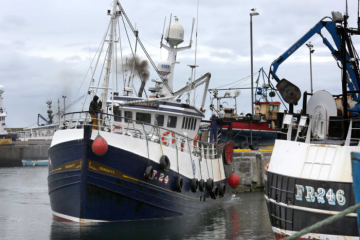 The EU referendum results marks “a seismic change” for the fishing industry, according to many in it, as it will restore the UK’s long-lost control over the greater part of the northern European fishing grounds. In Scotland the fleet has declined during Britain’s time in Europe. The 2007 workforce of 4,408 fishermen regularly employed on Scottish-based fishing boats, was approximately half that employed in the early 1970s when Britain joined what was then the European Economic Community (EEC). The number of fishing boats over 10m long was 1318 in 1990, 958 in 2000, and only 583 in 2014. The numbers fell as the European Commission exerted more and more control over how much could be caught, in an efforts to conserve fish stocks which scientists warned were at risk. Read the story here 11:47
The EU referendum results marks “a seismic change” for the fishing industry, according to many in it, as it will restore the UK’s long-lost control over the greater part of the northern European fishing grounds. In Scotland the fleet has declined during Britain’s time in Europe. The 2007 workforce of 4,408 fishermen regularly employed on Scottish-based fishing boats, was approximately half that employed in the early 1970s when Britain joined what was then the European Economic Community (EEC). The number of fishing boats over 10m long was 1318 in 1990, 958 in 2000, and only 583 in 2014. The numbers fell as the European Commission exerted more and more control over how much could be caught, in an efforts to conserve fish stocks which scientists warned were at risk. Read the story here 11:47
Alaska Salmon Harvest Nears 5 Million Fish
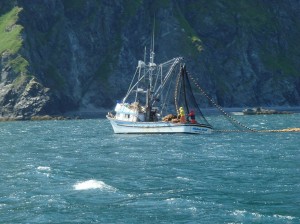 Commercial harvests of Alaska’s wild salmon have expanded statewide, with total deliveries nearing 5 million fish, including nearly 3 million sockeyes. Preliminary harvest figures compiled by the Alaska Department of Fish and Game show that in the westward region, processors in the Alaska Peninsula have received 950,000 humpies, 883,000 sockeyes, 134,000 chums and fewer than 1,000 cohos. At Chignik, the catch reached 334,000 reds, 16,000 chums, 7,000 pinks and 1,000 kings, and at Kodiak 176,000 sockeyes, 63,000 chums, 8,000 pinks and 1,000 kings. In Prince William Sound,,, Read the rest here 10:25
Commercial harvests of Alaska’s wild salmon have expanded statewide, with total deliveries nearing 5 million fish, including nearly 3 million sockeyes. Preliminary harvest figures compiled by the Alaska Department of Fish and Game show that in the westward region, processors in the Alaska Peninsula have received 950,000 humpies, 883,000 sockeyes, 134,000 chums and fewer than 1,000 cohos. At Chignik, the catch reached 334,000 reds, 16,000 chums, 7,000 pinks and 1,000 kings, and at Kodiak 176,000 sockeyes, 63,000 chums, 8,000 pinks and 1,000 kings. In Prince William Sound,,, Read the rest here 10:25
The Garden State Seafood Association strongly opposes the ‘‘Shark Fin Trade Elimination Act of 2016’’
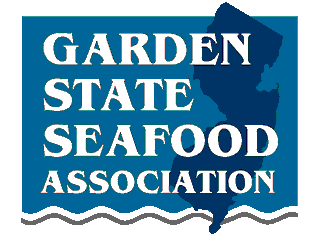 Finning of sharks (the process of removing fins at sea and discarding the shark) is currently illegal in the U.S. and Garden State Seafood Association (GSSA) supports that law. The Shark Conservation Act of 2010 (SCA) prohibits any person from removing any of the fins of a shark at sea and discarding its body. The GSSA supports this law and existing associated exemptions for spiny dogfish and smooth dogfish sharks. However, there is a direct federal allowance for the sale and possession of legally-harvested shark fins regulated and supported by NOAA, the U.S. Congress and the Obama Administration. Any effort to overturn this allowance at the federal level is simply not based on fact. Read the rest here 09:58
Finning of sharks (the process of removing fins at sea and discarding the shark) is currently illegal in the U.S. and Garden State Seafood Association (GSSA) supports that law. The Shark Conservation Act of 2010 (SCA) prohibits any person from removing any of the fins of a shark at sea and discarding its body. The GSSA supports this law and existing associated exemptions for spiny dogfish and smooth dogfish sharks. However, there is a direct federal allowance for the sale and possession of legally-harvested shark fins regulated and supported by NOAA, the U.S. Congress and the Obama Administration. Any effort to overturn this allowance at the federal level is simply not based on fact. Read the rest here 09:58
Antiquities Act abuse heads East – U.S. Rep. Rob Bishop (R-Utah)
 Some say cultural trends start on the West Coast and make their way East, but one trend moving eastward is bad news for New Englanders. In my home state of Utah, the federal government owns 65 percent of the land. That is a problem. In the waning days of his administration, President Clinton compounded the problem by mandating the Grand Staircase Escalante National Monument. With virtually no local support, he locked up 1.7 million acres of Utah, an area larger than some states. This monument designation was an abuse of the Antiquities Act. Passed in 1906, the Antiquities Act was originally intended for presidents to quickly prevent looting of archaeological sites. The executive power exercised under the Antiquities Act has grown far beyond the original purpose.,, The same story threads throughout the West, most recently in February when President Obama — who has designated the highest acreage of national monument land and water of any U.S. president — designated three different national monuments in the California desert. Now the president has his sights set on New England fisheries off the coast of Cape Cod. Read the rest here 08:46
Some say cultural trends start on the West Coast and make their way East, but one trend moving eastward is bad news for New Englanders. In my home state of Utah, the federal government owns 65 percent of the land. That is a problem. In the waning days of his administration, President Clinton compounded the problem by mandating the Grand Staircase Escalante National Monument. With virtually no local support, he locked up 1.7 million acres of Utah, an area larger than some states. This monument designation was an abuse of the Antiquities Act. Passed in 1906, the Antiquities Act was originally intended for presidents to quickly prevent looting of archaeological sites. The executive power exercised under the Antiquities Act has grown far beyond the original purpose.,, The same story threads throughout the West, most recently in February when President Obama — who has designated the highest acreage of national monument land and water of any U.S. president — designated three different national monuments in the California desert. Now the president has his sights set on New England fisheries off the coast of Cape Cod. Read the rest here 08:46
NC fishermen and their advocates say local festivals should sell local seafood
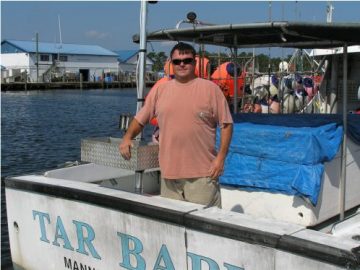 We post a lot of articles about local festivals, for the fishermen! If the fishermen are not being served, we will not promote those festivals. We do not promote imported shrimp or Tilapia. Period. – Dewey Hemilright has spent more than half his life in North Carolina’s commercial fishing industry, but he says he has never heard a bigger fish story than the claim by the Outer Banks Seafood Festival that it promotes the harvest he and his colleagues work so hard to haul in.“It’s a deception,” he said, after first using a colorful phrase that rolls more easily off the tongue of a career waterman. “They’re telling people – or at least implying to people – who come down here that they’re going to get local North Carolina seafood. They’re not. What they’re getting is imported. But put that on your sign and see how many people show up. It’s not right. You shouldn’t have to read the fine print.” Read the story here 17:59
We post a lot of articles about local festivals, for the fishermen! If the fishermen are not being served, we will not promote those festivals. We do not promote imported shrimp or Tilapia. Period. – Dewey Hemilright has spent more than half his life in North Carolina’s commercial fishing industry, but he says he has never heard a bigger fish story than the claim by the Outer Banks Seafood Festival that it promotes the harvest he and his colleagues work so hard to haul in.“It’s a deception,” he said, after first using a colorful phrase that rolls more easily off the tongue of a career waterman. “They’re telling people – or at least implying to people – who come down here that they’re going to get local North Carolina seafood. They’re not. What they’re getting is imported. But put that on your sign and see how many people show up. It’s not right. You shouldn’t have to read the fine print.” Read the story here 17:59
TEXAN FILES LAWSUIT AGAINST TEXAS PARKS AND WILDLIFE
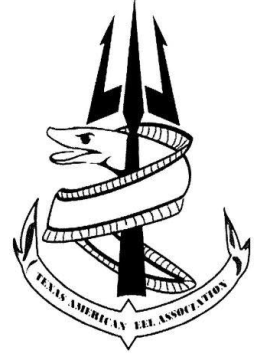 Local President of Texas American Eel Association Jason Fregia was denied the right to file a petition with Texas Parks and Wildlife to add the American Eel to the Texas commercial fishing list. Fregia’s intent was to introduce (TAEA) research to Texas Parks and wildlife proving the American Eel does exist in Texas waterways and Texas Parks and Wildlife is jeopardizing over $467.1 billion dollars in industries in Texas A possible lost in the Texas GDP of 35.7% of the Texas economy could be affected if the American eel was ever listed as endangered or threatened in the United States, according to the Texas comptroller Texas America eels could be generating a huge industry for the economy of Texas Read the complaint here 17:14
Local President of Texas American Eel Association Jason Fregia was denied the right to file a petition with Texas Parks and Wildlife to add the American Eel to the Texas commercial fishing list. Fregia’s intent was to introduce (TAEA) research to Texas Parks and wildlife proving the American Eel does exist in Texas waterways and Texas Parks and Wildlife is jeopardizing over $467.1 billion dollars in industries in Texas A possible lost in the Texas GDP of 35.7% of the Texas economy could be affected if the American eel was ever listed as endangered or threatened in the United States, according to the Texas comptroller Texas America eels could be generating a huge industry for the economy of Texas Read the complaint here 17:14






